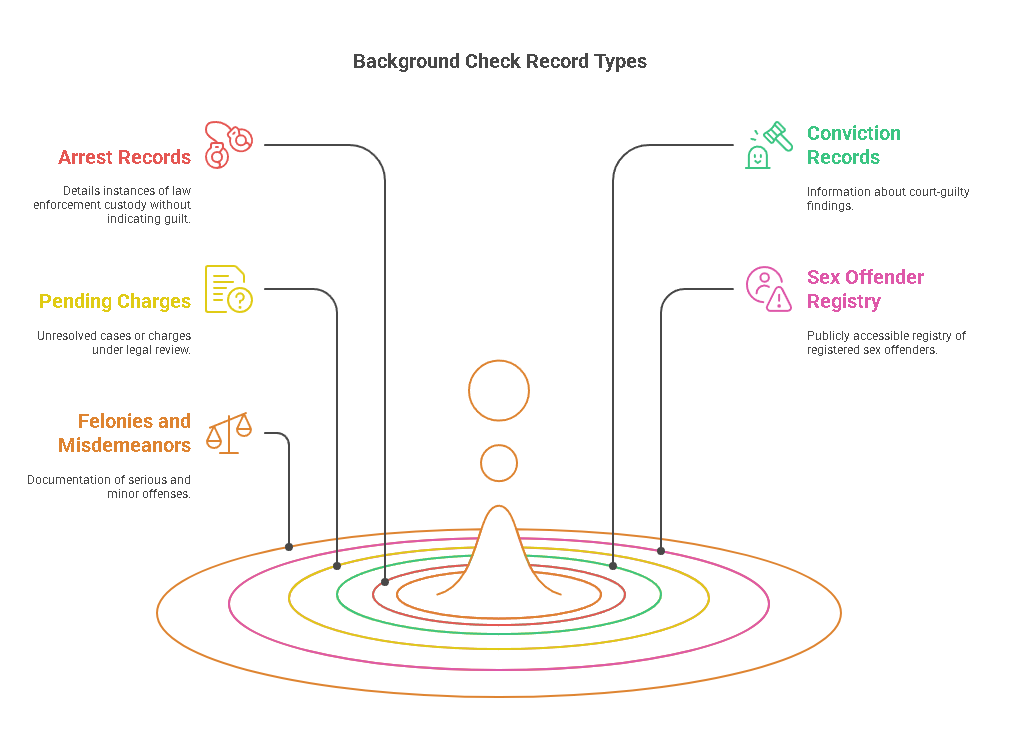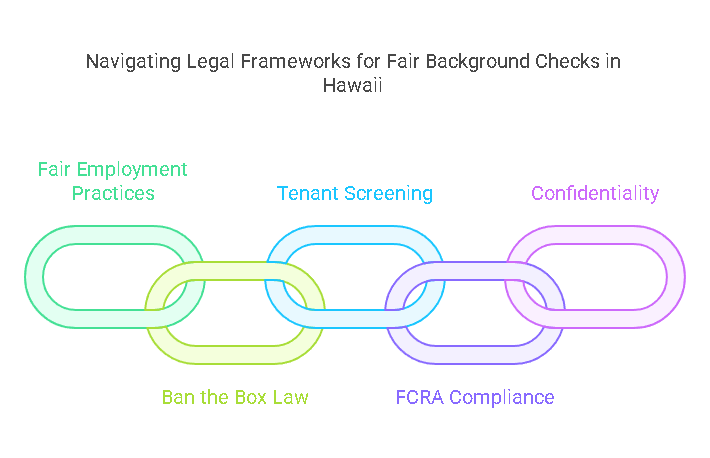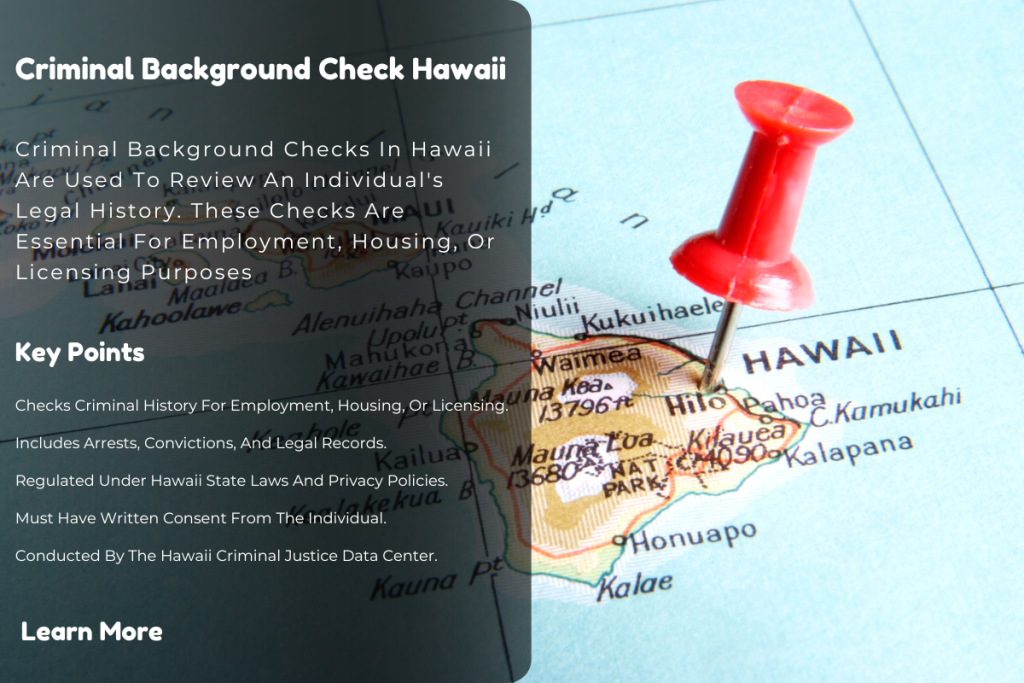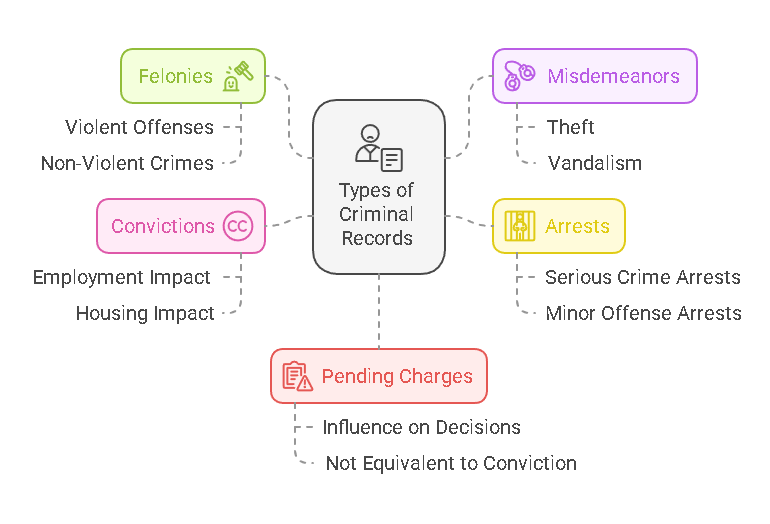How to Request a Criminal Background Check in Hawaii
Obtaining a criminal background check in Hawaii requires adherence to the state’s protocols to ensure accurate results. This process is primarily managed by the Hawaii Criminal Justice Data Center (HCJDC), the official repository for criminal history records in the state.
1. Requesting a Background Check
The HCJDC allows individuals and organizations to request background checks either in person, via mail, or online. To initiate a request, applicants need to provide key information such as the full legal name, date of birth, and in some cases, Social Security Number (SSN) or fingerprints of the person being checked.
Online Requests:
Online background checks are increasingly popular due to their convenience and faster processing times. The HCJDC’s secure online platform facilitates direct access to criminal records for authorized entities. Alternatively, employers and organizations can streamline this process by using specialized services like PreciseHire, which offers a user-friendly online interface to request and manage background checks efficiently.
In-Person or Mail Requests:
For those who prefer traditional methods, HCJDC also accepts requests in person or by mail. These methods are typically used for fingerprint-based checks or when additional documentation is required.
Fingerprint-Based Criminal Background Checks
Fingerprint-based checks are the gold standard for criminal background verification due to their accuracy. In Hawaii, certain professions, such as childcare providers, healthcare workers, and security personnel, may require fingerprint-based checks to meet compliance standards.
How Fingerprints Are Collected
Fingerprinting is conducted by authorized agencies or law enforcement offices. Digital fingerprinting is preferred as it reduces errors and speeds up processing. Here’s how it works:
- Appointment Scheduling: Applicants must schedule an appointment with an authorized fingerprint collection center.
- Fingerprint Submission: At the appointment, fingerprints are digitally scanned and submitted to the HCJDC.
- Results Analysis: The collected data is cross-referenced with state and national databases to uncover any criminal history.
Employers looking to integrate fingerprint-based checks into their hiring process can rely on PreciseHire for a seamless experience. Our service ensures compliance with Hawaii’s regulations while offering detailed reporting and swift turnaround times.
Types of Records Accessible Through Background Checks

The HCJDC provides various criminal records, depending on the nature of the request and the type of background check conducted.
Records Commonly Included:
- Arrest Records: These detail instances where an individual was taken into custody by law enforcement, though arrests do not indicate guilt.
- Conviction Records: Information about cases where the individual was found guilty by a court of law.
- Pending Charges: Details on unresolved cases or charges still under legal review.
- Sex Offender Registry: Hawaii’s publicly accessible registry includes information on individuals required to register as sex offenders under state law.
- Felonies and Misdemeanors: Both serious (felony) and minor (misdemeanor) offenses are documented.
Organizations and individuals can benefit from the thoroughness of PreciseHire, which integrates statewide and national databases to ensure no critical records are missed.
Costs Associated with Background Checks
The cost of conducting a criminal background check in Hawaii varies based on the type of check requested. General state-level checks through the HCJDC typically range from $20 to $30. Fingerprint-based checks, due to their additional complexity, may incur higher fees.
PreciseHire provides competitive pricing for comprehensive background check services, combining affordability with exceptional accuracy and compliance.
Processing Times and Potential Delays
The time required to process a criminal background check depends on the method and type of check.
- Online Requests: Results are often available within 1 to 3 business days.
- Fingerprint-Based Checks: These may take 1 to 4 weeks, as they involve verification through both state and federal databases.
Occasional delays may occur due to:
- Incomplete or inaccurate information provided during the request.
- High volumes of applications at the HCJDC.
- Manual verification processes for older or complex records.
To minimize delays and enhance efficiency, consider partnering with PreciseHire. Our system ensures that all required information is collected accurately, reducing the likelihood of processing holdups.
Local vs. Statewide Background Checks
Understanding the differences between local and statewide checks is essential when conducting a background check in Hawaii.
| Detail |
Local Check |
Statewide Check |
| Coverage |
Records from one specific county or city |
Records from all counties in Hawaii |
| Processing Time |
1 to 3 business days |
1 to 7 business days |
| Fingerprint Requirement |
Not typically required |
Often required for sensitive roles |
| Use Cases |
Tenant screening, local job applications |
Comprehensive employment checks |
Employers or individuals requiring broader coverage, including national-level checks, can use PreciseHire’s services for a detailed and reliable screening process.
Public vs. Restricted Access to Criminal Records
Criminal records in Hawaii are classified as either public or restricted access:
- Public Records: Includes conviction information and details from the sex offender registry. These can be accessed without explicit authorization.
- Restricted Records: Arrests not leading to convictions, sealed records, or expunged cases are typically restricted to authorized entities such as law enforcement or employers conducting regulated background checks.
When working with PreciseHire, our services ensure compliance with Hawaii’s legal requirements while respecting privacy laws.
Compliance and Accuracy
Employers and organizations conducting criminal background checks must prioritize compliance with Hawaii’s regulations and federal laws, including the Fair Credit Reporting Act (FCRA). Failure to do so can result in legal consequences or discrimination claims.
PreciseHire helps businesses navigate these complexities by offering compliant and accurate background checks tailored to meet Hawaii’s legal standards.
Legal Aspects of Criminal Background Checks in Hawaii

Conducting criminal background checks in Hawaii requires strict adherence to state and federal laws designed to protect both individuals and organizations. These laws ensure that background checks are conducted fairly, transparently, and in a manner that minimizes the risk of discrimination. Below are the key legal aspects to consider when conducting a criminal background check in Hawaii.
Hawaii Fair Employment Practices Act
The Hawaii Fair Employment Practices Act protects job applicants and employees from discrimination based on their criminal history unless it is directly relevant to the job. Employers are required to take a fair and reasonable approach, considering factors such as:
- The nature of the offense.
- How much time has passed since the conviction or sentence completion.
- The relationship between the conviction and the responsibilities of the job.
Employers must assess these factors individually for each applicant or employee rather than applying blanket disqualifications. This ensures fairness and reduces the risk of overlooking qualified candidates due to unrelated criminal history.
Ban the Box Law in Hawaii
Hawaii’s Ban the Box law is one of the most robust in the United States. Under this law, employers are prohibited from inquiring about an applicant’s criminal record until after a conditional job offer is made. This allows applicants to be judged on their qualifications and skills rather than their criminal history during the initial stages of the hiring process.
Ban the Box laws apply to public and private employers in Hawaii, and violations can result in fines or other penalties. Employers must ensure they follow these regulations to avoid legal consequences and maintain a fair hiring process.
Criminal Records in Tenant Screening
For landlords, conducting criminal background checks is a common step in screening potential tenants. However, Hawaii law requires landlords to approach this process fairly and transparently. Landlords must:
- Notify applicants in writing that a criminal background check will be conducted.
- Obtain the applicant’s written consent before proceeding.
- Provide a copy of the background check report if the results lead to denial of the application.
Similar to employment decisions, landlords should avoid blanket disqualifications based on criminal history. Instead, they should evaluate whether the record is relevant to the safety of other tenants or the property.
Compliance with the Fair Credit Reporting Act (FCRA)
When employers or landlords use third-party services to conduct background checks, they are required to comply with the Fair Credit Reporting Act (FCRA). The FCRA establishes clear guidelines to protect individuals during the screening process:
- Notification: Individuals must be informed that a background check will be conducted.
- Authorization: Written consent must be obtained before proceeding with the check.
- Adverse Action Procedures: If an adverse decision is made based on the results, individuals must be provided with a copy of the report and a summary of their rights under the FCRA.
Partnering with a reputable background check provider like our company ensures that all checks are conducted in compliance with FCRA guidelines. This protects both the organization and the individuals involved.
Confidentiality and Handling of Criminal Records
Maintaining confidentiality is a critical aspect of criminal background checks. Employers and landlords in Hawaii must:
- Limit access to sensitive information to authorized personnel only.
- Store records securely to prevent unauthorized access.
- Properly dispose of outdated records to protect the privacy of individuals.
Failing to handle criminal records responsibly can result in legal penalties and reputational damage. Using a professional background check service helps organizations manage these responsibilities effectively.
FAQs About Criminal Background Checks in Hawaii
Criminal background checks in Hawaii can be requested through the Hawaii Criminal Justice Data Center (HCJDC). Individuals, employers, and landlords can submit their requests online, in person, or by mail. A professional background check provider, such as our company, simplifies this process by handling the paperwork and ensuring compliance with state and federal laws.
The processing time for criminal background checks in Hawaii depends on the type of check requested:
- Online name-based checks: Typically take 1–3 business days.
- Fingerprint-based checks: Can take 1–4 weeks, especially if national databases need to be searched for additional verification.
Using our services can streamline the process and ensure accurate results within the shortest possible timeframe.
Yes, criminal background checks on others are allowed for legitimate purposes such as employment screening, tenant screening, or legal proceedings. However, accessing someone’s criminal history without proper authorization or a valid reason may violate privacy laws. Our company ensures that all background checks are conducted ethically and legally.
Yes, Hawaii’s employment laws, including the Fair Employment Practices Act and Ban the Box legislation, restrict employers from using criminal records to make unfair hiring decisions. Employers must evaluate whether the criminal history is directly related to the job and cannot reject applicants solely based on their record without considering other factors.
If you discover an error in your criminal background check, take the following steps:
- Contact the Hawaii Criminal Justice Data Center: Request a correction of inaccuracies in your record.
- Notify the background check provider: If you used a third-party service, inform them of the discrepancy and provide supporting documentation.
- Follow up: Ensure that the corrections are made promptly and that updated records are sent to all relevant parties.
Our company offers support in resolving errors and ensuring the accuracy of criminal background check results.
The Importance of Accuracy and Compliance
Accuracy and compliance are critical when conducting criminal background checks in Hawaii. Employers and landlords must ensure that their practices are fair, lawful, and transparent. Failure to comply with state and federal regulations can result in legal liabilities and damage to an organization’s reputation.
Using a trusted background check service eliminates the risk of non-compliance and ensures that the process is handled professionally. Our company provides reliable, compliant, and efficient background check solutions tailored to meet the unique needs of employers, landlords, and individuals in Hawaii.
Conclusion
Criminal background checks in Hawaii play an essential role in promoting safe and trustworthy environments, whether in workplaces, rental properties, or legal settings. By understanding the state’s legal framework, including the Fair Employment Practices Act and Ban the Box laws, employers and landlords can make informed decisions while respecting the rights of individuals.
Accuracy and compliance are paramount in conducting background checks, as errors or missteps can lead to legal liabilities and undermine trust. Partnering with a professional background check service ensures that the process is handled efficiently, ethically, and in alignment with both state and federal regulations.
Our company is dedicated to providing reliable and comprehensive background check solutions tailored to the needs of employers, landlords, and individuals in Hawaii. By leveraging our expertise, you can navigate the complexities of criminal background checks with confidence, ensuring that every decision is fair, lawful, and informed.





